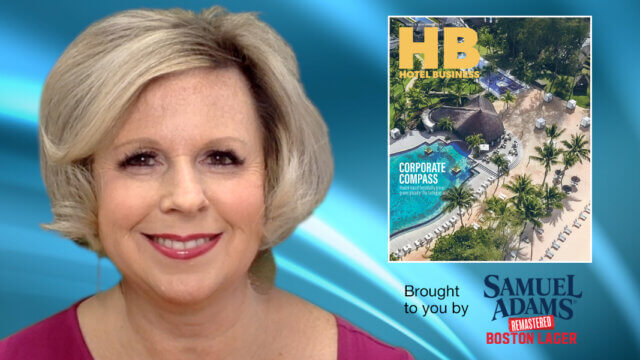During the latest Hotel Business Hot Topics session, “Consumer expectations: Restoring confidence in the travel experience,” with sponsor support from Delos, panelists discussed how the hotel industry will reassure guests that health and safety protocols are being adhered to.
Moderated by Abby Elyssa, digital content manager, Hotel Business, the group of panelists included Peter Scialla, COO, Delos; Dr. Zachary Pope, research scientist, physiology & behavior, Well Living Lab; Kevin Maciulewicz, SVP, resort operations, Wyndham Destinations; and Kevin Locraft, VP, partner success, vacation rental, Expedia Group.
Today’s guests are looking for reassurance that hotels are following health and safety guidelines from government agencies such as the Center for Disease Control and Prevention (CDC) and the World Health Organization (WHO). But will they need to see some window placard or certificate providing some proof of compliance?
“While the CDC, WHO, NIH [National Institute of Health] and all these health organizations do a wonderful job putting out guidelines and mapping those guidelines to science, they are not organizations that accept documentation for certification, “said Scialla. “In other words, they don’t do a third-party review or site inspections or things of that nature that would validate from a third-party perspective that guidelines have been used to inform policy and procedures.”
Thus the WELL Health-Safety Rating from the International WELL Building Institute (IWBI), Delos’ wholly-owned subsidiary, was launched in July of last year.
“We have been a third-party certification body and standard-bearer for healthy buildings since 2014, upwards of about two billion sq. ft. across 85 countries applying for some sort of certification or rating of their spaces as it pertains to the health aspects,” said Scialla. “So, with the broader WELL Building standard having encompassed many categories beyond pathogen transmission risk and things of that nature, we were asked to provide a designation as a subcategory of the broader WELL Building standard and WELL certification related to health and safety. Hence, we did provide the industry with an opportunity to achieve the WELL Health-Safety Rating. To date, there are 10s of 1,000s of buildings across all technologies, including hotels, that are applying and achieving the WELL Health-Safety Rating, which is a good sign of confidence.”
Locraft disagreed that certification necessarily will be needed.
“I’m not sure that certification is the word that I would use,” he said. “I think travelers are going to require transparency of what each partner, building or inventory unit type is doing in order to meet certain guidelines. Some are going to go as far as becoming third-party certified and others will simply make statements on generally following guidelines. Ultimately, I don’t believe that families will require a certification by a third party in order for something to be deemed worthy for them to travel to, but I do think every traveler is going to be thinking about health, hygiene and safety protocols more and more frequently as we move forward.”
Maciulewicz has seen guests’ opinions on cleaning and safety protocols shift as a result of the pandemic.
“Pre-pandemic, as we were doing guest research, the cleanliness of the resort was not in the top three from an expectation perspective,” he said. “It’s quickly become number one or number two when you look at different research; that [guests] want to feel comfortable being on-site. They want to hear what’s happening before that. Our owner services group fields many calls every day about the protocols that we have in place, and I think the confidence that either an independent [property] or a company is doing everything it can to provide a safe environment and lets people relax on vacation is ultimately the goal.”
Pope believes that it will take more than just the statements from the scientific organizations to grow consumer confidence.
“While they have a lot to say, I think that something additional that says, ‘Hey, this hotel is following all necessary precautions’ is going to continue being very important, even past this pandemic,” he said. “I think we are going to see wellness and the care for the spaces that we occupy while on vacation become that much more important.”
Maciulewicz noted that the CDC recommendations were only a guide to the enhanced health and safety protocols that needed to be implemented.
“When we were building our protocols as the pandemic hit and we were closing resorts back in February and March of last year, and then putting the new protocols together, we partnered with Ecolab on the certification program,” he said. “We looked at all the CDC recommendations and actually did more because I don’t think what the CDC puts out is the baseline. I think there’s more that resorts have to do, and that’s certainly what we did. COVID is going to leave a lasting impression for some time, and we definitely plan to keep our protocols in place, especially from a safety and sanitation perspective.”
Pope pointed out that there is an advantage by having a third-party verification system in place.
“There’s always that lag for these larger organizations—the CDC and WHO in particular; they’re finally catching up to the science,” Pope said. “[The Well Living Lab and IWBI] can be a little bit more nimble and really provide the market with what they need at that time in a little bit quicker manner than would the CDC or WHO. It’s probably not the CDC’s forte or responsibility to dictate what [the hotel industry does], I think that having third-party validation also allows for a quicker translation of what the most current science says to the actual consumer.”
Look for more coverage on this Hot Topics webinar in the June 15 issue of Hotel Business.


